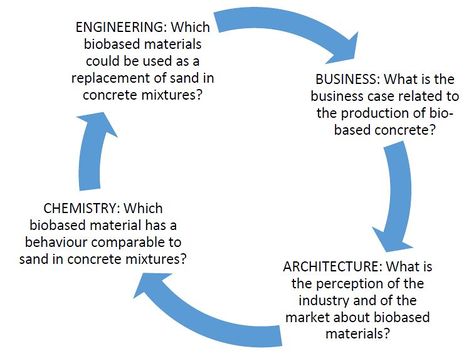PR 00288: verschil tussen versies
(Nieuwe pagina aangemaakt met ' {{Project config}} {{Project |Name=Alternative materials for the construction industry |Supercontext=PR 00223 |Start date=2020/01/26 |Summary=One way to reduce con...') |
Geen bewerkingssamenvatting |
||
| Regel 1: | Regel 1: | ||
The 20th century has been characterized by an eight-fold intensification of resources usage, in concomitance with a dramatic increase of greenhouse emissions and of energy consumption. In this light, the risk of outmatching the planet’s capacity is becoming reality and the effects of an uncontrolled growth are becoming more and more evident. | |||
Among the different economic sectors, the construction industry is the largest global consumer of materials and construction materials are becoming more and more the key for global economic development. | |||
Among those materials, sand has a particular role in the construction industry; now the second most used natural resource behind water, sand is the primary component in concrete, glass, and many other materials. On the other hand, natural sand production is a slow process. As a result, sand is consumed at a faster pace than it’s replenished. | |||
One way to reduce consumption of sand is to optimize and introduce the use of alternative materials for concrete production. Using bio-based materials instead of sand, will additionally provide large environmental benefits for the construction industry. | |||
These problem can be approach from different points of view. Three sub-questions belonging to different disciplines will try to give answers to this problem: | |||
[[Bestand:Biobased materials Sand.jpg|gecentreerd|miniatuur|469x469px]] | |||
'''Research type:''' Desk research, qualitative and quantitative studies, laboratory tests, market research | |||
'''Research level:''' minor | |||
'''Prerequisite:''' Interest in bio-based and circular economy, interest in sustainability | |||
Partners: Scalda, TU/Eindhoven, Avans Hogeschool. | |||
{{Project config}} | {{Project config}} | ||
{{Project | {{Project | ||
Huidige versie van 5 feb 2020 om 14:30
The 20th century has been characterized by an eight-fold intensification of resources usage, in concomitance with a dramatic increase of greenhouse emissions and of energy consumption. In this light, the risk of outmatching the planet’s capacity is becoming reality and the effects of an uncontrolled growth are becoming more and more evident.
Among the different economic sectors, the construction industry is the largest global consumer of materials and construction materials are becoming more and more the key for global economic development.
Among those materials, sand has a particular role in the construction industry; now the second most used natural resource behind water, sand is the primary component in concrete, glass, and many other materials. On the other hand, natural sand production is a slow process. As a result, sand is consumed at a faster pace than it’s replenished.
One way to reduce consumption of sand is to optimize and introduce the use of alternative materials for concrete production. Using bio-based materials instead of sand, will additionally provide large environmental benefits for the construction industry.
These problem can be approach from different points of view. Three sub-questions belonging to different disciplines will try to give answers to this problem:
Research type: Desk research, qualitative and quantitative studies, laboratory tests, market research
Research level: minor
Prerequisite: Interest in bio-based and circular economy, interest in sustainability
Partners: Scalda, TU/Eindhoven, Avans Hogeschool.

